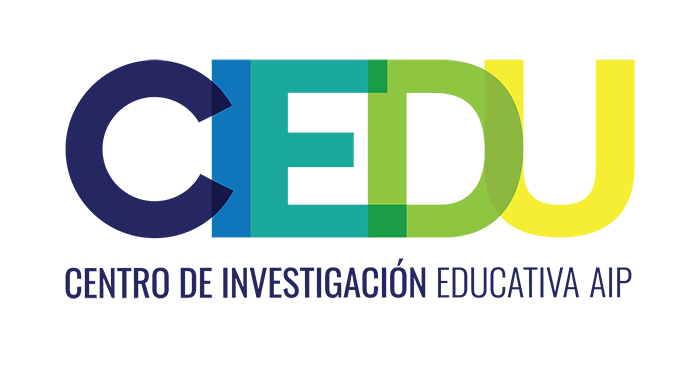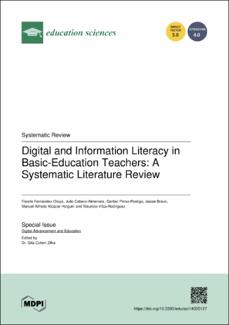Mostrar el registro sencillo del ítem
Digital And Information Literacy In Basic-education Teachers: A Systematic Literature Review
| dc.contributor.author | Fernández-Otoya, Fiorela | |
| dc.contributor.author | Cabero-Almenara, Julio | |
| dc.contributor.author | Pérez-Postigo, Gerber | |
| dc.contributor.author | Bravo, Jessie | |
| dc.contributor.author | Alcázar-Holguin, Manuel Alfredo | |
| dc.contributor.author | Vilca-Rodríguez, Mauricio | |
| dc.date.accessioned | 2024-01-30T15:37:02Z | |
| dc.date.available | 2024-01-30T15:37:02Z | |
| dc.date.issued | 2024 | |
| dc.identifier.citation | : Fernández-Otoya, F.; Cabero-Almenara, J.; Pérez-Postigo, G.; Bravo, J.; Alcázar-Holguin, M.A.; Vilca-Rodríguez, M. Digital and Information Literacy in Basic Education Teachers: A Systematic Literature Review. Educ. Sci. 2024, 14, 127. https://doi.org/10.3390/ educsci14020127 | en_US |
| dc.identifier.uri | https://repositorio.ciedupanama.org/handle/123456789/374 | |
| dc.description | Digital transformation has become constant and has forced governments to reevaluate the validity of their educational models; therefore, regarding digital and information literacy, to train teachers to improve new digital skills becomes essential. For these reasons, this research will explore the instruction of teachers in digital and information literacy in basic education; likewise, there will be an observation of the research’s theoretical-methodological characteristics related to these variables, and, also, we will carry out an analysis of the most pertinent contributions on the impact of new literacies and competencies in the teaching–learning processes in basic education, with the purpose of obtaining a current state overview of its teacher training within the framework of the technologies’ usage linked to teaching. This review was based on the guidelines of the PRISMA protocol, and to select 56 documents, the Scopus and Web of Science (WoS) databases were used. The results show that, in the Scopus database, Spain is the country with the most research on the subject, with 29% of the total, followed by Indonesia, with 6%, and the United States, with 4%, and that the articles focus mainly on the social sciences and computer science. Likewise, in WoS, the country with the most research on the subject is Spain, with 30%, followed by Russia, with 10%, and Norway, with 8%, and the articles mainly revolve around the categories of education and communication. The research related to this topic uses a quantitative approach in 68%, a qualitative approach in 25% and a mixed approach in 7%. It was shown that there is a direct relationship between digital and information literacy and digital competency. In addition, it is also emphasized that digital and information literacy are continuous and long-term processes. More didactic proposals on digital skills would be necessary, over government policies and efforts, to achieve a community with a high level of digital and information literacy. | en |
| dc.description.abstract | Digital transformation has become constant and has forced governments to reevaluate the validity of their educational models; therefore, regarding digital and information literacy, to train teachers to improve new digital skills becomes essential. For these reasons, this research will explore the instruction of teachers in digital and information literacy in basic education; likewise, there will be an observation of the research’s theoretical-methodological characteristics related to these variables, and, also, we will carry out an analysis of the most pertinent contributions on the impact of new literacies and competencies in the teaching–learning processes in basic education, with the purpose of obtaining a current state overview of its teacher training within the framework of the technologies’ usage linked to teaching. This review was based on the guidelines of the PRISMA protocol, and to select 56 documents, the Scopus and Web of Science (WoS) databases were used. The results show that, in the Scopus database, Spain is the country with the most research on the subject, with 29% of the total, followed by Indonesia, with 6%, and the United States, with 4%, and that the articles focus mainly on the social sciences and computer science. Likewise, in WoS, the country with the most research on the subject is Spain, with 30%, followed by Russia, with 10%, and Norway, with 8%, and the articles mainly revolve around the categories of education and communication. The research related to this topic uses a quantitative approach in 68%, a qualitative approach in 25% and a mixed approach in 7%. It was shown that there is a direct relationship between digital and information literacy and digital competency. In addition, it is also emphasized that digital and information literacy are continuous and long-term processes. More didactic proposals on digital skills would be necessary, over government policies and efforts, to achieve a community with a high level of digital and information literacy. | en |
| dc.format | application/pdf | en |
| dc.language.iso | en | en |
| dc.language.iso | en | en_US |
| dc.publisher | MDPI | en_US |
| dc.rights | info:eu-repo/semantics/openAccess | en |
| dc.rights | https://creativecommons.org/licenses/by-nc-nd/4.0 | en |
| dc.subject | digital literacy; information literacy; digital competence; regular basic education; teachers | en_US |
| dc.subject | digital literacy; information literacy; digital competence; regular basic education; teachers | en |
| dc.title | Digital And Information Literacy In Basic-education Teachers: A Systematic Literature Review | en |
| dc.type | info:eu-repo/semantics/article | en_US |
| dc.type | info:eu-repo/semantics/publishedVersion | en_US |
| dc.type | info:eu-repo/semantics/article | en |
| dc.type | info:eu-repo/semantics/publishedVersion | en |
Ficheros en el ítem
Este ítem aparece en la(s) siguiente(s) colección(ones)
-
Artículos Científicos [293]
Esta colección contiene artículos científicos educativos o en áreas relacionadas a educación. Pueden ser sobre Panamá o sobre otras áreas que puedan ser de utilidad.

